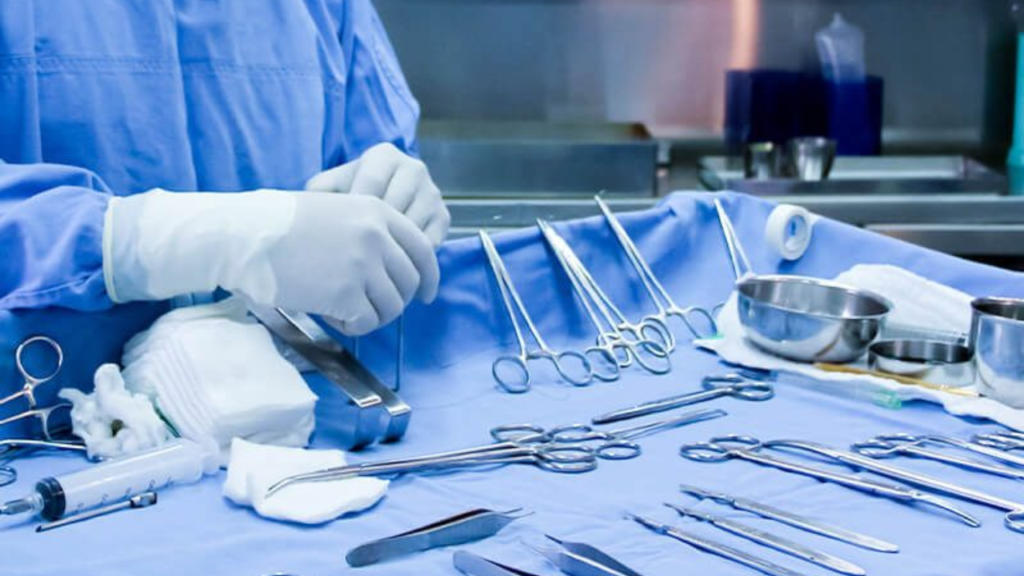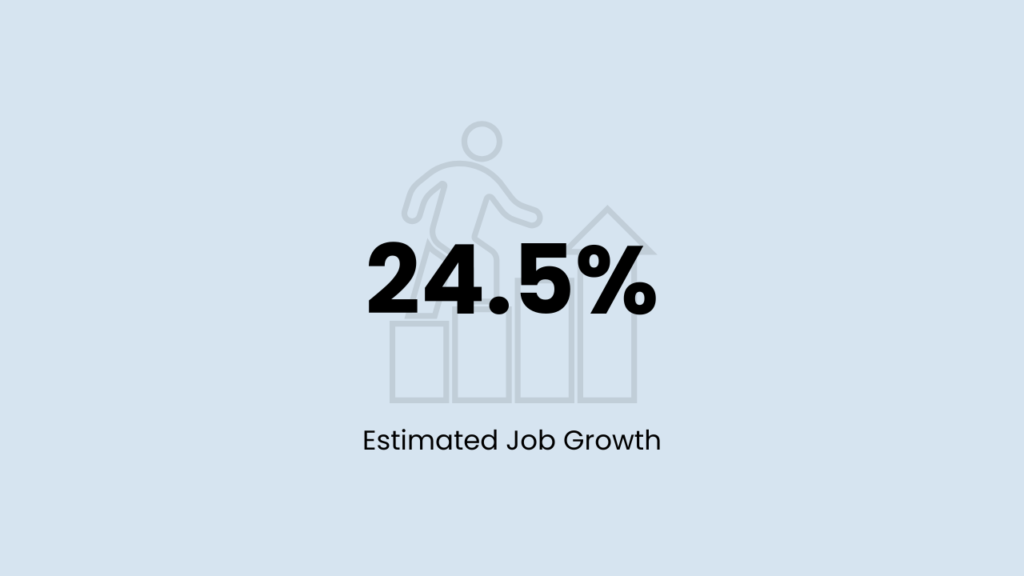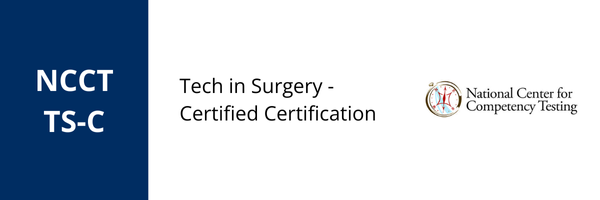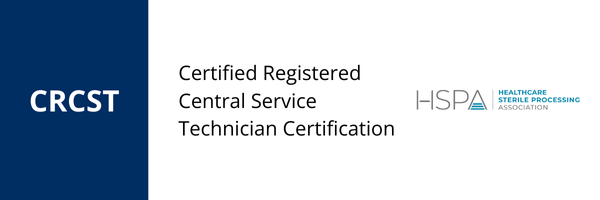ST 9000
Surgical/Sterile Processing Technician
100% Online Certification Training
Earn professional certification as a Sterile Processing Technician and pursue career opportunities in hospitals, surgery centers, clinics, and other healthcare facilities.




Certifications earned


What Does a Surgical/Sterile Processing Technician Do?
A Surgical/Sterile Processing Technician is responsible for receiving, documenting, packaging, sterilizing, storing, and distributing instruments, equipment, and supplies essential for patient care. Beyond sterile processing duties, the technician also supports patient care across all age groups before, during, and after surgical procedures by performing scrub duties and contributing as part of the surgical team. This role upholds patient safety, privacy, and confidentiality while ensuring compliance with all legal requirements and adhering to strict sterilization standards when handling sharp or contaminated instruments.
- Exhibit a clear understanding of the essential soft skills required of an allied healthcare professional
Recognize the value of customer service, effective communication, and professionalism
Perform sterilization of medical instruments and equipment
Provide assistance to surgeons during procedures
Carry out cleaning, decontamination, and disinfection processes
Manage documentation and maintain accurate records
Differentiate responsibilities across preoperative, intraoperative, and postoperative phases
What You’ll Learn – ST 9000 Surgical/Sterile Processing Technician
In the Surgical/Sterile Processing Technician program, students will engage in coursework focused on professionalism in healthcare, human anatomy, and medical terminology, along with the core principles of sterile processing and the use of surgical technologist tools and procedures.
The program prepares students for the Tech in Surgery Certification (TS-C) offered by the NCCT and the optional Certified Registered Central Service Technician (CRCST) certification offered by the HSPA.
Both certifications require hands-on clinical experience. TS-C candidates must complete and document at least 125 surgical cases, which must be submitted to NCCT within two (2) years of passing the TS-C exam. Students are required to secure a verified clinical site prior to enrolling in this program.
CRCST candidates must complete 400 hours of practical experience in a Central Services department within six (6) months of passing the CRCST exam. Students are responsible for arranging their own clinical site to meet this requirement.
We highly recommend that students review local job postings and verify any state-specific requirements, restrictions, or barriers before enrollment to ensure they meet eligibility criteria upon graduation.
Note: Some Amara programs may have state or regional restrictions. Please review our State Restriction page to confirm eligibility based on your location or intended place of employment.
This Program Has Additional On Site Clinical Requirements
Program Courses
| Code | Course | Duration |
|---|---|---|
| PS 1011 | Professionalism in Allied Health | 2 Weeks |
| HI 1014 | Introduction to Human Anatomy and Medical Terminology | 6 Weeks |
| HI 6014 | Sterile Processing | 6 Weeks |
| HI 6016 | Surgical Technology | 10 Weeks |
| Total Program Duration | 24 Weeks |
Enrollment Requirements
- Web browser with internet connection
- Course registration & payment
- English language proficiency
- Employer/Clinical Sponsorship – Applicants to these programs MUST provide verification that an Employer or Clinical Site has agreed to accept the applicant in efforts to fulfill “surgical case” requirements required for Tech in Surgery (TS-C) certification before enrollment. With this Sponsorship, the student must be guaranteed to perform a minimum of required surgical cases completed and reported to NCCT within two (2) years of passing the TS-C exam.
- The Amara Student Clinical Site Information Form must be submitted to Amara prior to enrollment.
Amara Covered Materials
- Expert-led video based training
- Competency assessments
- National Certification exam fee
*The cost of all materials needed for this program are covered by Amara. They are not included in the tuition costs and are provided at no additional cost to students. However, students have access to these materials for a limited time frame aligned with their program. Access to these materials outside of this period is not guaranteed, and students may be responsible for costs associated with any extended access.
Student Services
- Dedicated Student Success Advisors
- Tailored support based on performance & behavior
- Exam preparation process
- Career Services Advisor
Clinical Requirements
- CRCST requirements: 400 hours of hands-on experience in a Central Services Department within 6 months of passing the exam. Please visit the HSPA website for a breakdown of the specific disciplines.
- TS-C requirements: 125 surgical cases completed within two years of passing the TS-C exam. Please visit the NCCT website for a breakdown of the specific cases required. NOTE: Sponsorship Acknowledgement Form must be signed by the clinical site agreeing to host the student for post program surgical cases before student can enroll.
Surgical/ Sterile Processing Technician

Active Duty Military Grants
Amara accepts education benefits from the Department of Defense for Active Duty Army, Coast Guard and Air Force.
Military Spouse Grants
Spouses of Active Duty Service Members in certain ranks may be eligible for assistance up to $2,000 per fiscal year.
Workforce Grants
Amara partners with American Job Centers in 30+ states and accepts Workforce Innovation and Opportunity Act (WIOA) and other workforce grant funding.
FAQs: Surgical/Sterile Processing Technician Online Certification Training Program
What is a Surgical/Sterile Processing Technician?
A Surgical/Sterile Processing Technician is responsible for sterilizing, packaging, and managing surgical instruments and equipment. They work in hospitals, surgery centers, and clinics, ensuring that all surgical tools are properly cleaned, decontaminated, and stored. They also assist in the care of patients before, during, and after surgical procedures by performing scrub duties and related tasks
What is the Career Outlook for a Surgical/Sterile Processing Technician?
The career outlook for Surgical/Sterile Processing Technicians is very positive, with available jobs expected to grow by 5% over the next ten years.
How Do I Become a Surgical/Sterile Processing Technician?
To start your career journey as a Surgical/Sterile Processing Technician,, you need a high school diploma or equivalent, provide the Sponsorship Acknowledgement form signed by prospective employer agreeing to host the graduate for post-program surgical cases (scrubs) as a full-time/part-time employee, extern, or apprentice (required to attain TS-C certification), complete a formal training program such as Amara, pass the TS-C exam offered by the National Center for Competency Testing, and the CRCST exam offered by the Healthcare Sterile Processing Association. Students who pass the TS-C exam are required to complete the following hands-on requirements within two years of passing the NCCT exam. Students are responsible for securing their clinical sites:
- A minimum of 30 (maximum of 50) scrubs in general surgeries and
- Minimum of 75 scrubs in at least three (3) of the following areas
- Gynecology
- Genitourinary
- Cardiovascular
- Neurosurgery
- Obstetrics
- Thoracic
- Peripheral Vascular
- Ophthalmology
- Otorhinolaryngology
- Plastic/Reconstructive
- Other (please specify)
- Orthopedic
- Diagnostic Scopes (Maximum of 15)
Students who pass the CRCST exam are required to complete a total of 400 hours of hands-on experience in a Central Services (CS) department in the following categories. Students are responsible for securing their clinical sites:
- Decontamination (120 hours)
- Quality Assurance Processes (24 hours)
- Preparing and Storing Instruments (120 hours)
- Storage and Distribution (24 hours)
- Sterilization and Disinfection (96 hours)
- Equipment (16 hours)
What skills will I learn in your online Surgical/Sterile Processing Technician certification training program?
In the Amara online Surgical/Sterile Processing Technician training program, you will learn a comprehensive range of skills, including sterilization techniques, surgical instrument management, decontamination procedures, surgical suite preparation, infection control, patient care during surgical procedures, legal and health regulations compliance, and maintaining surgical equipment.
What are the enrollment requirements for your Surgical/Sterile Processing Technician certification training program?
To enroll in the Amara’s Surgical/Sterile Processing Technician training program, you need a web browser with an internet connection, course registration and payment and verification of an Employer or Clinical Sponsorship. This sponsorship must confirm the applicant can fulfill the “surgical case” requirements for the Tech in Surgery (TS-C) certification. Additionally, the Amara Student Clinical Site Form must be submitted prior to enrollment.
Do you offer any scholarships or grants for your online Surgical/Sterile Processing Technician certification training program?
While Amara does not offer financial aid, students may be eligible for options through government grant-funded programs like:
How long is your Surgical/Sterile Processing Technician certification training program?
The total program duration is 24 weeks if completing 15-20 hrs of coursework per week.
How is your Surgical/Sterile Processing Technician certification training program structured and taught?
The program is developed with collaboration from industry-recognized subject matter experts and includes interactive simulations, interviews with real-world experts, game-based learning, and more, catering to every type of learner.
Do you offer certification exam prep or help for the Surgical/Sterile Processing Technician exams?
Yes, the program includes a strategic exam preparation process and dedicated Student Success Advisors to provide tailored support based on performance.
What’s included in your Surgical/Sterile Processing Technician certification training program?
The program includes expert-led video-based training, competency assessments, and the national certification exam fee. All materials needed for the program are covered by Amara.
Is your Surgical/Sterile Processing Technician certification training program valid nationwide?
Some Amara programs may have certain restrictions depending on your state or region. If you have questions about your eligibility, please contact us at (443) 900-3027 or email us at training@amaracareertraining.com and our team will be happy to assist you.
Is your Surgical/Sterile Processing Technician certification training program accredited?
We’re not institutionally accredited as a training provider, but the certifications you’ll earn in this program are accredited through the exam-issuing authorities, the NCCT and HSPA. So while our school itself doesn’t hold accreditation, you’ll earn an accredited certification upon passing your national exams and completing clinical requirements.
Are there any clinical requirements for receiving your Surgical/Sterile Processing Technician certifications?
To become fully certified, students who pass the TS-C exam are required to complete the following hands-on requirements within two years of passing the NCCT exam. Students are responsible for securing their clinical sites:
- A minimum of 30 (maximum of 50) scrubs in general surgeries and
- Minimum of 75 scrubs in at least three (3) of the following areas
- Gynecology
- Genitourinary
- Cardiovascular
- Neurosurgery
- Obstetrics
- Thoracic
- Peripheral Vascular
- Ophthalmology
- Otorhinolaryngology
- Plastic/Reconstructive
- Other (please specify)
- Orthopedic
- Diagnostic Scopes (Maximum of 15)
To become fully certified, students who pass the CRCST exam are required to complete a total of 400 hours of hands-on experience in a Central Services (CS) department in the following categories. Students are responsible for securing their clinical sites:
- Decontamination (120 hours)
- Quality Assurance Processes (24 hours)
- Preparing and Storing Instruments (120 hours)
- Storage and Distribution (24 hours)
- Sterilization and Disinfection (96 hours)
- Equipment (16 hours)
